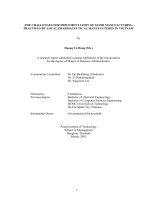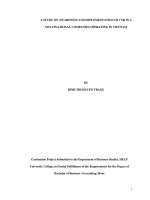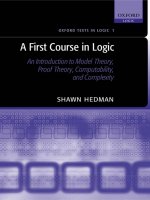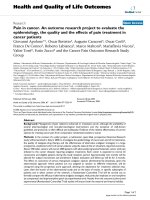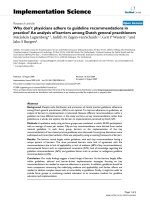Implementation of argumentation in geography lessons in vietnam an analysis of geography schoolbook tasks, teachers perceptions and quality of pupils written argumentation
Bạn đang xem bản rút gọn của tài liệu. Xem và tải ngay bản đầy đủ của tài liệu tại đây (3.42 MB, 164 trang )
Implementation of Argumentation in Geography Lessons
in Vietnam – an Analysis of Geography Schoolbook Tasks,
Teachers’ Perceptions and Quality of Pupils’ Written
Argumentation
Inaugural – Dissertation
zur
Erlangung des Doktorgrades
der Mathematisch-Naturwissenschaflichen Fakultät
der Universität zu Köln
vorgelegt von
Thanh Tam Nguyen
aus Dong Thap, Vietnam
Köln 2018
1
Berichterstatter:
Prof. Dr. Alexandra Budke
Prof. Dr. Frank Schäbitz
Vorsitz der Prüfung:
Prof. Dr. André Bresges
Beisitzer:
PD Dr. Günther Weiss
Tag der letzten mündlichen Prüfung: 24.7.2018
2
List of Figures
Figure 1. Research questions ………………………………………………... 14
Figure 2.1 Theoretical approaches to studies on education in developing 18
contexts……………………………………………………………………..
Figure 2.2 Toulmin’s graphical representation of an argument…………….
19
Figure 2.3 An example of Toulmin’s argument……………………………
20
Figure 2.4 Various structures of premises and conclusions in an argument..
22
Figure 2.5: Connecting elements in an argument…………………………… 22
Figure 2.6 Freeman’s argumentation scheme……………………………….. 23
Figure 2.7: Potential benefits from argumentation………………………….. 24
Figure 2.8 The role of argumentation……………………………………….. 25
Figure 2. 9 Quality levels in the production of pupils’ written
argumentation………………………………………………………………..
28
Figure 3.1 Administrative map of Socialist Republic of Vietnam ………….
30
Figure 3.2 The education system in Vietnam……………………………….
32
Figure 3.3: Subjects in the school…………………………………………..
34
Figure 3.4 The new school subjects…………………………………………
35
Figure 3.5 Competences in Geography based on the latest curriculum…….
37
Figure 3.6 Geography schoolbooks in Vietnam…………………………….
38
Figure 3.7 A Geography lesson in the Vietnamese schoolbook…………….
39
Figure 4.1 An overview of the methodology used in the study……………..
44
Figure 4.2 Argumentation analysis………………………………………….
54
Figure 5.1 A common task in Geography schoolbooks…………………….
58
Figure 5.2 An argumentation task in Geography schoolbooks…………….
58
Figure 5.3 Argumentation task in the upper secondary schoolbooks……….
59
Figure 5.4 Argumentation task in the secondary-level schoolbooks……….
59
Figure 5.5 Reasoning tasks in the Geography schoolbooks………………..
60
3
Figure 5.6 Argumentation and reasoning tasks in Geography-related
contexts…………………………………………………………………….
60
Figure 5.7. An argumentation task in human Geography context………….
61
Figure 5.8 A reasoning task in economic Geography……………………….
61
Figure 5.9 An argumentation task in secondary-level schoolbooks………… 61
Figure 5.10 A reasoning task on the population topic………………………. 62
Figure 5.11 Argumentation task in physical Geography ……………………. 62
Figure 5.12 A reasoning task in physical Geography ………………………
63
Figure 5.13 The percentage of argumentation and reasoning tasks in
Geography schoolbooks from grade 4th to grade 12th ………………..
63
Figure 6.1 The separate groups of teachers based on their knowledge about 66
argumentation……………………………………………………………….
Figure 6.2. Teachers’ awareness about the role of argumentation in 70
geography lessons…………………………………………………………
Figure 6.3 Teachers’ perception of obstacles to using argumentation in
geography lessons………………………………………………………..
78
Figure 7.1 Analysis of a pupil’s argumentation………………………….
86
Figure 7.2 A simple argumentation……………………………………….
88
Figure 7.3 A complex argumentation …………………………………….
89
Figure 7.4 An example for the suitability check ………………………….
92
Figure 7.5 A statement without evidence………………………………….
93
Figure 7.6 A complex argumentation………………………………………
94
Figure 7.7 Non-argumentation……………………………………………..
95
Figure 7.8 Structures of pupils’ written argumentations……………………
96
Figure 7.9 The quality of argumentation based on gender …………………
98
Figure 8.1 Amount of argumentation tasks in the Geography schoolbooks of 101
Vietnam and Germany ……………………………….
Figure 8.2 Reason for the limited use of argumentation by teachers……….
102
Figure 8.3 The role of argumentation in the perspective of teachers………..
103
4
Figure 8.4 Reasons why the quality of pupils’ written argumentation is low… 105
Figure 8.5 Integration of argumentation in Geography lessons in Vietnam… 106
Figure 8.6 Consequences for the University in the process of integrating 111
argumentation in Geography lessons……………………………………….
5
List of Tables
Table 3.1 Length of Geography lessons in Vietnam………………….
41
Table 4.1 The task in Geography schoolbooks in Vietnam…………..
45
Table 4.2 Processing of formulation of interview questions…………
47
Table 4.3 Overview of the interviewed teachers …………………….
49
Table 4.4 Categories and subcategories of teacher knowledge in
argumentation analysis……………………………………………….
49
Table 4.5 Analysis of pupils’ written argumentation ………………………..
53
Table 5.1. Argumentation and reasoning tasks in Geography 57
schoolbooks…………………………………………………………..
Table 7.1 The quality of Vietnamese pupils’ written argumentation…
94
Table 7.2 Pupils’ argumentation ……………………………………..
95
6
Contents
ACKNOWLEDGEMENTS ................................................................................................ 10
SUMMARY ........................................................................................................................ 11
1. Argumentation in Geography lessons in Vietnam........................................................... 12
1.1 Research questions and objectives of the thesis ........................................................ 14
1.2 Structure of the thesis ................................................................................................ 15
2. The importance of argumentation.................................................................................... 17
2.1 The origins of research on argumentation – a philosophical view ............................ 18
2.1.1 Toulmin’s argumentation research ...................................................................... 19
2.1.2 Views on argumentation...................................................................................... 20
2.2 The importance of argumentation in education ......................................................... 23
2.3 Argumentation in Geography lessons ........................................................................ 26
2.4. Argumentation studies in Vietnam ........................................................................... 29
3. General information on Vietnam ..................................................................................... 30
3.1 Education system in Vietnam .................................................................................... 31
3.2 School subjects .......................................................................................................... 34
3.3 Geography curriculum ............................................................................................... 35
3.4 Geography schoolbooks ............................................................................................. 37
3.5 Geography lessons ..................................................................................................... 39
3.6 Geography teachers in Vietnam ................................................................................. 41
4. The methodology ............................................................................................................. 43
4.1 Analysis of argumentation tasks in Vietnamese Geography schoolbooks ................ 43
4.1.1 The sampling ....................................................................................................... 43
4.1.2 Collect and analysis of tasks ............................................................................... 45
4.2 Analysis of teachers’ perception of argumentation ................................................... 46
4.2.1 Interviews with teachers-formulation of question ............................................... 46
4.2.2 Data collection..................................................................................................... 48
4.2.3 Data analysis ....................................................................................................... 49
4.3 Research methods to investigate the quality of pupils‘ argumentation ..................... 50
4.3.1 Data collection..................................................................................................... 51
4.3.2 Lesson preparation .............................................................................................. 52
4.3.3 Analysis of pupil argumentation ......................................................................... 53
5. The importance of argumentation in Vietnamese Geography schoolbooks .................... 58
7
5.1 Argumentation and reasoning tasks in Vietnamese Geography school books .......... 58
5. 2 Argumentation and reasoning tasks in Geography-related contexts ........................ 61
5.2.1 The argumentation and reasoning tasks in human Geography ........................... 62
5.2.2 Argumentation and reasoning tasks in human-environment interaction ............. 62
5.2.3 Argumentation and reasoning tasks in physical Geography ............................... 63
5.3 The distribution of reasoning and argumentation tasks in grades 4th to 12th ............. 64
6. The importance of argumentation in teachers’ perception .............................................. 66
6.1 Teachers knowledge about argumentation ................................................................ 66
6.1.1 Teachers’ conception of argumentation .............................................................. 66
6.1.2 The role of argumentation in the process of learners’ development ................... 70
6.2 Teachers’ experience of using argumentation as a teaching method ......................... 74
6.2.1 Teachers’ argumentation training at universities ................................................ 74
6.2.2 Perception of argumentation in geography schoolbooks .................................... 74
6.2.3 Geography topics suitable for argumentation ..................................................... 75
6.2.4 Methods to teach and to motivate pupils in using argumentation in the classroom
...................................................................................................................................... 76
6.3 Teachers’ attitudes toward argumentation ................................................................. 78
6.3.1 The opportunities of using argumentation in geography lessons ........................ 78
6.3.2 The obstacles to the implementation of argumentation in geography lessons .... 79
6.3.3 The importance of implementing argumentation in geography lessons ............. 84
6.4 Possibilities to integrate argumentation in Vietnamese geography lessons .............. 84
6.4.1 Adequate teaching materials for argumentation.................................................. 85
6.4.2 Teacher training on argumentation ..................................................................... 85
7. Quality of pupils’ written argumentation ........................................................................ 87
7.1 Pupils’ written argumentation analysis ...................................................................... 87
7.1.1 Simple argumentation ......................................................................................... 88
7.1.2 Complex argumentation ...................................................................................... 89
7.1.3 Non-argument...................................................................................................... 94
7.2 The quality of pupils’ written argumentation ............................................................ 94
7.3 Pupils’ perspectives in their argumentation ............................................................... 99
8. Discussion on the integration of argumentation in Geography lessons in Vietnam ...... 102
8.1 Review of the research question “In how far are argumentation tasks integrated in
Geography schoolbooks?” ............................................................................................. 102
8
8.2 Review of the question “In how far do Vietnamese Geography teachers understand
argumentation?” ............................................................................................................. 103
8.3 The quality of pupils’ written argumentation .......................................................... 105
8.4 Outlook .................................................................................................................... 113
References ......................................................................................................................... 114
Annex ................................................................................................................................ 118
Annex 1: Geography teacher’s interview questions (Chapter 6) ................................... 118
Annex 2. Geography lessons in the schools (pictures). ................................................. 119
Annex 3. List of Geography teachers who is interviewee in this project ...................... 122
Annex 4. Geography teacher’s perceptions in Argumentation ...................................... 124
Annex 5. Some of pupils’ statements ............................................................................ 158
9
ACKNOWLEDGEMENTS
This study could not have been completed without assistance. Therefore, I am
gratefully giving my acknowledgement to the persons who offered their support
during this study.
First of all, I would like to express my endless gratitude to my supervisor Prof.
Dr. Alexandra Budke for her enthusiastic guidance, patience, insightful ideas,
enlightening discussions, and continuous encouragement at every stage of the study.
This research would not have finished without her support. I would also like to thank
Prof. Dr. Frank Schäbitz for his help. A special thanks goes to the members of the
Geography Didactic Institute at the University of Cologne, who inspired me
throughout this study: Veit Maier, Michael Morawski, Jan Glatter, Kristina Schulz,
Miriam Kuckuck, Frederik von Reumont, Iris Breuer…
I am grateful to the leaders of the Vietnamese Ministry of Education and
Training, the Vietnamese International Education Development and the Dong Thap
University for funding and thus allowing me to run this project as a PhD student at
the University of Cologne in Germany.
The research done in the Dong Thap province in Vietnam took place with the
support of principals, teachers and pupils in high schools. A special thanks goes to all
of the 40 high school teachers in the Dong Thap Province, whom I contacted for
interviews. Many thanks also to Mr. Van Loc LE, who offered many insights on the
process of applying argumentation in Geography lessons in Vietnam. I would like to
thank my Geography teachers’ group as well, who applied argumentation in
Geography lessons in high schools: Mr. Hao, Ms. Truc, Ms. Thuyen, Ms. Khoa, Ms.
Le. My Geography teachers’ team spent more time to use argumentation in
Geography lessons.
Finally, I am deeply indebted to my parents, my wife and my friends for the
sacrifices they made during my study in Germany.
10
SUMMARY
This empirical research focuses on the integration of argumentation in
Geography lessons in Vietnam. Argumentation has been studied by many disciplines
such as Philosophy, Logic, Argumentation theory, Linguistics, etc. The usage of
argumentation in Geography lessons has been analysed in the studies of, for example,
Budke et al. (2010), Budke (2012a, 2012b) and Budke and Meyer (2015). The most
important result of this project is a snapshot of the current status of the integration of
argumentation in Vietnamese Geography lessons. The argumentation tasks in
Geography schoolbooks, the perceptions of Geography teachers regarding
argumentation, as well as pupils’ quality of argumentation are presented in this work.
The consequences of the results, further possible studies and the outlook on
researching argumentation in Geography lessons in Vietnam are also discussed here.
Key words: Argumentation, Vietnam, Geography lessons, Teachers, Pupils,
Schoolbooks, Curriculum.
Zusammenfassung
Die empirische Arbeit fokussiert sich auf die Integration von
Argumentationskompetenz in den Geographieunterricht in Vietnam. Argumentation
wurde extensiv in verschiedenen Disziplinen wie der Philosophie oder der Linguistik
untersucht. Die Verwendung von Argumentationen im Geographieunterricht wurde
u.a. in Studien von Budke et al. (2010), Budke (2012a, 2012b) und Budke und Meyer
(2015) analysiert. Das wichtigste Ergebnis der hier vorliegenden Arbeit ist es,
zunächst den Status Quo der Bedeutung von Argumentation im vietnamesischen
Geographieunterricht zu identifizieren. Dies geschieht über eine Analyse
vietnamesischer Geographieschulbücher, einer Analyse der Wahrnehmung und
Einstellung von vietnamesischen Geographielehrkräften bezogen auf die Behandlung
von Argumentation sowie einer Analyse der Argumentationsfähigkeiten von
vietnamesischen Geographieschüler*innen. Die Ergebnisse der Analysen werden
unter besonderer Berücksichtigung einer nachhaltigen Implementation von
Argumentationen im vietnamesischen Geographieunterricht diskutiert. Weiterhin
werden Impulse für weiteren Forschungsbedarf reflektiert.
Keywords: Argumentation, Vietnam, Geographiedidaktik, Lehrer*innen,
Schüler*inne, Schulbücher, Curriculum
11
1. Argumentation in Geography lessons in Vietnam
Many things are under development in Vietnam nowadays, such as the
development in agriculture, economy, tourism, etc. In agriculture, rice requires a long
development time in Vietnam. There are currently two strategies to produce rice in
Vietnam. The first one is the traditional method. It involves farmers who do not use
advanced techniques on their farms. Therefore, the quality and quantity of the
resulting rice are not so good and the own rice is used. The second trend in rice
production is applying advanced agricultural techniques. Farmers use modern
machines, high quality rice, bio rice or the modern method to control rice. Therefore,
the quality of the resulting rice using this method is superior, leading to. This type of
rice being exported to other countries in the world and farmers earning more money.
Given the description above, if you were a farmer in Vietnam, what kind of method
would you like to use in your farm? For answering this question, farmers would need
argumentation strategies.
This is one reason why argumentation is very necessary in Vietnam nowadays.
Here is another example: The age of retirement is currently discussed in Vietnam. An
increase in the age of retirement both for men and women is being considered. A
man’s work life could increase with 2 years (from 60 to 62 years old), while a woman
could retire at 60 years old (previously at 55). If you were a citizen in Vietnam, would
you agree to this suggestion? How old would you like to be when you stop working?
How can you bring arguments to support your opinion?
Education and training are one of the top priorities in Vietnam’s development
strategy and it is currently being renewed and changed according to the resolution
number 29-NQ/TW, 2013 of National Assembly. The national education system, the
goals for every subject in the school, school textbooks, teaching methods, etc. are
updated nowadays. Regarding teaching methodologies, this resolution states that:
“the methodologies should be used for promoting positive, active, creative and useful
knowledge and skills of learners;[…] Focus on learning how to think, encourage selflearning, create a basis for learners to improve themselves and renew their
12
knowledge, skills, and develop their abilities […]” (National Assembly of Vietnam,
2013, p. 2). This decision brings along a good opportunity to apply argumentation in
Vietnamese schools because argumentation is one of the strategies that aligns with
the new methodological goals.
Scientists show that argumentation plays an important role in the cognitive and
metacognitive learning processes. Argumentation supports the development of
communicative and critical thinking. It can also develop scientific literacy.
Argumentation supports the acculturation in the scientific culture and the
development of epistemic criteria for scientific knowledge, as well as the
advancement of reasoning, particularly the choice of theories or opinions based on
rational criteria (Erduran & Jiménez-Aleixendre, 2007, p. 11).
Budke and Meyer (2015, p. 14) list the importance of argumentation that offers
learners the possibility to a) understand and produce oral, written arguments in
various subjects and b) understand social arguments. Consequently, they develop
possibilities to use argumentation in their communities, not only in schools, by using
argumentation. Pupils can develop competencies such as opinion formation, critical
thinking, self-reflection and analysis of social values, maturity and moral
development. In terms of skills, argumentation supports the ability to interact
compromise and reach a consensus, the capacity to withstand contradiction and
different views, the ability to find peaceful solutions, as well as the development of
personality. Argumentation helps learners to understand specialized content, gain
knowledge on fictional questions, controversies and justifications. It also contributes
to self-development by expanding the knowledge on scientific thinking and
understanding of scientific reasoning.
The study on the integration of argumentation in Geography lessons in
Vietnam is a very necessary work in this context. This research is inspired from
similar empirical studies about argumentation (Toulmin, 2003) and is centered on the
definition of an argument, the role of argumentation in Geography lesson and the
usage of argumentation in Geography classes (Budke & Uhlenwinkel, 2011). The
13
most important aspect of this project is the integration of argumentation in
Vietnamese Geography lessons. The related problems and consequences are also
discussed. The results of this study are a reliable scientific basis that can contribute
to the improvement of pupils’ competencies in order to meet the national education
goals. The findings of this research can help teachers be more selective in their
teaching methods to enhance learners’ independent thinking in order to educate the
Vietnamese people comprehensively.
Overview of the research questions:
1.1 Research questions and objectives of the thesis
Research questions
In how far is it possible to integrate argumentation in the
Vietnamese Geography lessons?
Secondary research questions
1. How important are argumentation and reasoning
tasks in the Vietnamese Geography schoolbooks?
(chapter 5)
2. In how far do Vietnamese Geography teachers
understand the importance of argumentation in
teaching Geography? (chapter 6)
3. How is the quality of pupils’ written
argumentations in Geography contexts? (chapter 7)
Figure 1. Research questions
The main research question focuses on the implementation of argumentation
in Geography education in Vietnam. The project would like to investigate Geography
curriculum, Geography textbooks with argumentation, teachers’ perceptions about
argumentation and the quality of pupils’ written argumentation.
14
1.2 Structure of the thesis
This thesis is divided into eight chapters. The first chapter concentrates on the
relevance of the study. The research questions and the structures of the thesis have
been shown in this chapter.
The second chapter presents the theoretical aspects related to argumentation.
The most important results of studies on argumentation are discussed in this chapter.
The definitions of arguments and argumentation are presented as well. The
importance of argumentation is also explained.
In the third chapter, the local research is introduced. Information on the
Vietnamese education system, the subjects in the school, the Geography curriculum,
the Geography schoolbooks, the Geography teachers, etc. is provided. The aim of this
part is to supply the readers with the necessary details on the Vietnamese context for
this study.
The fourth chapter introduces the methodological approach. This project uses
both quantitative and qualitative research methodologies. The research methods
involved are quantitative analysis of argumentation tasks, observations in the class,
expert interviews, argumentation analysis.
The fifth, the sixth and the seventh chapters present the results of the empirical
investigation. The analysis of argumentation and reasoning tasks in Vietnamese
schoolbooks is detailed in the chapter five. The perspectives of Geography teachers
concerning the integration of argumentation in their classes and schools are shown in
chapter six. The quality of pupils’ written argumentation is analyzed in chapter seven.
The overall results are discussed in chapter eight. The number of
argumentation tasks in Geography schoolbooks are reviewed based on existing
studies on argumentation tasks in schoolbooks. The perspectives of Geography
teachers in Vietnam on argumentation are discussed in view of empirical research on
the role of argumentation in education sciences. The reasons for the quality of pupils’
15
written argumentation in Vietnam is discussed in this chapter as well. Furthermore,
the strengths, weaknesses, opportunities and consequences of the integration of
argumentation in Geography classes and the outlook of this project are discussed
towards the end of the chapter.
16
2. The importance of argumentation
Argumentation is a complex topic which has been studied for a very long time
by researchers from various disciplines such as Philosophy, Logic, Argumentation
theory, Linguistics, etc. All of the scientists came to the conclusion that
argumentation adds an important dimension not only in professional activities (van
Eemeren et al., 2014) but also in daily life. The goal of argumentation is the usage of
logical reason to reach an agreement with the conversational partners. Argumentation
is a way of solving problems; a thesis is confirmed or falsified via reasons (Lueken,
2000; Bayer, 1999; Kienpointner, 1992). In daily life, plans must be made, or many
people face adversity, where decisions have to be made and they have to be justified
by argumentation (Mirza & Perret-Clermont, 2009). These decisions need to be
formulated, justified or disproved. In both cases (profession and daily life),
argumentation is very helpful because it supports people in making the best decision.
This chapter highlights the theoretical framework of the study and the state of
the art concerning the research on argumentation. The first subchapter presents the
definition of argumentation and researchers’ approaches in different disciplines. The
second subchapter analyses the importance of argumentation in education. The third
sub-chapter lists the empirical studies on argumentation in Geography lessons. The last
part of this chapter is an overview on argumentation studies in Vietnam (see Fig 2.1).
17
Theoretical approach
The origins of
argumentation research
The importance of
argumentation in
education
Argumentation in
Geography lessons
Authors
Aristotele and Socrates
The first study on argumentation
Toulmin (2003)
The basic argumentation structure
Freeman (2011); Lapakko
(2009) and van Eemeren et Definitions for argumentation
al. (2014)
Erduran &
JiménezThe importance of argumentation in
Aleixendre (2007)
education
Budke & Meyer (2015)
Budke et al. (2010), Budke - The structure of argumentation in
& Uhlenwinkel (2011), Geography lessons
Budke (2012a, 2012b)
- Argumentation analysis in
Geography-related topics
Leder (2017)
Studies on
argumentation in
Vietnam
Key aspects relevant for the
research approach
Integration of argumentation in India
Ho (2011), Ngo (2011),
The possibility to use argumentation
Tran & Nguyen (2011),
in Vietnam
Trinh & Nguyen (2014).
Figure 2.1 Theoretical approaches to studies on education in developing contexts
2.1 The origins of research on argumentation – a philosophical view
Aristotle is a philosopher who ran the first research on argumentation, as
considered by the "Rhetoric" in 367-322 BC, a work well known as Aristotle's
Rhetoric. Subsequently, many researchers studied argumentation (Toulmin, 2003;
Walton et al, 2008), but Toulmin is considered the most important in this field given
the fact that his study was developed later on by many experts, especially in
education. In the book "The Uses of Argument", first published in 1958, Toulmin
built on Aristotle's Rhetoric and designed the structure of arguments. This study did
not only formulate the basic theory in argumentation, but is viewed also as a starting
point in applying argumentation in other sciences. Toulmin’s argumentation study
has been analyzed by many experts such as Verheij (2006), Rowe et al. (2006). They
discussed the elements of Toulmin’s argumentation structure (Verheij, 2006;
18
Freeman, 2011) and established their theory based on Toulmin’s argument (Verheij,
2006), while other educational scientists transferred these ideas to their fields of
interest such as Philosophy, History, Mathematics, Literature and Geography.
2.1.1 Toulmin’s argumentation research
Toulmin (2003, p. 97) sketched the basic structure of an argument. His concept
consists of data (evidence), conclusions (contested assertion) and the final rule
(validity relationship); it additionally draws a fine structure of argumentation. In the
final rule described by Toulmin, an operator is often added to indicate the degree of
validity of the validity relationship. This process may be identified by words such as
“mandatory”, “certainly”, “probably”, etc. Furthermore, according to Toulmin (2003,
p. 97), exceptions under which the validity relationship is irrelevant are often defined.
Ultimately, support (additional data) is often cited, which is intended to prove the
validity relationship. The structure of argumentation designed by Toulmin has been
used successfully for data analysis by a variety of empirical studies on education.
Every argumentation takes place in thematic contexts, which defines what is
contentious and what could be used as proof or concluding rule.
D
So, Q, C
Since
Unless
W
R
On account of
B
Figure 2.2 Toulmin’s graphical representation of an argument (2003, p. 97)
19
Harry was born
in Bermuda
}
So, presumably
Since
A man born in
Bermuda will
generally be a
British subject
is a
{ Harry
British subject
Unless
Both his parents were
aliens/he has become a
naturalised American/...
On account of
The following statutes
and other legal
provisions
Figure 2.3 An example of Toulmin’s argument (2003, p. 97)
2.1.2 Views on argumentation
Many works have focused on defining argumentation. In the recent research,
van Eemeren et al. (2014) reviewed the meaning of argumentation in different
languages. In Dutch “argumentatie” refers to the process of argumentation, or
“argomentazione” in Italian, or “argumentación” in the Spanish language and
“argumentation” in English. Eemeren et al. define argumentation as “a
communicative and interactional act complex aimed at resolving a difference of
opinion with the addressee by putting forward a constellation of propositions the
arguer can be held accountable for to make the standpoint at issue acceptable to a
rational judge who judges reasonably” (2014, p. 7).
Billig (1987) showed that an argument has an individual meaning and the
individual meaning refers to any piece of a reasoned discourse. According to Hample
(2003, p. 439), “an argument is the face-to-face exchange of messages, especially
those conveying reasons, in contemplation of actual or potential disagreement”.
Kuhn and Udell (2003) shared a similar view. They use the terms “argumentation” or
“argumentative discourse” to describe a social process or an activity; to them,
argumentation is knowledge justification or persuasion. Jiménez-Aleixandre and
20
Rodriguez (2000) definition of argumentation is particularly relevant in education
since a goal of scientific inquiry is the generation and the justification of claims,
beliefs, and actions taken to understand nature. According to Finocchiaro (2005, p.
15), an argument is “an instance of reasoning that attempts to justify a conclusion by
supporting it with reasons or defending it from objections”. Simon et al. (2006)
showed that the meaning of the argument refers to the substance of claims, data,
warrants, and backings that contribute to the content of an argument. Kuhn and
Franklin (2006) wrote that argument and argumentation present the two contexts in
which the term “argument” is used, both as product and process. The dialogic process
in which two or more people engage in debates of opposing claims can be defined as
argumentation or argumentative discourse in order to distinguish it from argument as
a product and the characteristic of argumentation. Lapakko (2009) considered that
argumentation is not synonym to arguing. It is not the same as logic, debate or
persuasion. In his view, “argumentation is the process of advancing, examining, and
responding to claims, primarily through the use of reasoned discourse” (Lapakko,
2009, p. 10). According to the Cambridge online dictionary (McIntosh, 2016), an
argument is a disagreement or the process of disagreeing and argumentation is a set
of arguments used to explain certain factors or to persuade people. Concerning
Geography lessons, Budke & Meyer (2015, p. 17-18) wrote that argumentation is a
method for problem-solving in which a conflicting statement is disapproved or
affirmed through reasoning. The essential structure of the argumentation includes
data, warrant, conclusion and three of these combined with qualifier, backing and
rebuttal to build the full argumentation.
There are many definitions for argumentations, but in general, two main
elements are discussed, namely argument and argumentation. Argument means these
elements of for or again another opinion or statement. Argumentation is the process
of assembling these components.
Another important researcher for argumentation schemes is Freeman. Freeman
put forward several theories to develop the standard approach of argument theory. In
this approach, Freeman (2011) showed that the simplest structure of an argument
21
must contain at least one premise (1) and minimum one conclusion (2) (see Fig 2.4a).
The simple argument requires a premise connected to statement, but normally
arguments have a larger number of premises and conclusions (see Fig 2.4 (b), (c), (d),
(e)). These premises and conclusions interact the various ways (see Fig 2.4).
1
2
e
3
c
3
2
1
2
1
3
1
2
a
3
2
d
)
1
b
Figure 2.4 Various structures of premises and conclusions in an argument (Freeman, 2011
p. 3-6)
The structure of the constituents of an argument
1
arranged this way leads to the conclusion that a conclusion
(3) arises from a premise (1) to (2), or that several premises
are relevant for the conclusion such as premises are (4) and
4
2
5
(5) relevant to (6); or statement (7) would be supported by
premises (8) and (9). A modus ponens of an argument is the
multi-facetted inference rules connecting statements (3) and
6
3
(6) to the conclusion (7) (fig 2.5). There are two premises in
the argument structure (fig 2.5). (1), (2), (3) represent an
7
argument and (4), (5), (6) another argument. Both of them
are premises for the conclusion (7).
8
9
Figure 2.5: Connecting elements in an argument (Freeman, 2011, p. 6)
22
The diagram in figure 2.6 shows Freeman’s argumentation scheme. In this
system, there are many elements assigned to an argument. There are at least four
arguments in the figure 2.6. (1), (5), (6), (7) are grouped into an argument, the same
as (8), (2) ,(7) and (9), (3), (7).
5
1
8
4
2
3
9
6
7
7
7
7
Figure 2.6 Freeman’s argumentation scheme (2011, p. 9)
2.2 The importance of argumentation in education
The role of argumentation in the context of classroom teaching has been
recognized by a number of relevant studies (Erduran & Jiménez-Aleixandre, 2007,
Budke & Meyer, 2015).
Erduran and Jiménez-Aleixendre (2007) revealed at least five potential
contributions of argumentation in education (see Fig 2.7). The first potential is the
support of argumentation in accessing cognitive and metacognitive processes typical
for expert performance and enabling modelling for students. The second dimension
shows that argumentation upholds the improvement of communicative competences
23
and students’ critical thinking. Furthermore, argumentation helps to develop scientific
literacy and empowers students to talk and to write in the language of science. The
fourth potential is that argumentation contributes to the socialization in the practices
of the scientific culture and to the development of epistemic criteria for scientific
knowledge. The last benefit is that argumentation plays an important role in the
improvement of reasoning, particularly the choice of theories or opinions based on
rational criteria.
Higher order
cognitive processes
Enculturation in
scientific culture
supports
supports
Developing
epistemic criteria
Public reasoning
involves
Rhetorical
moves
involves
involves
as
Argumentation
persuasion
involves
connected
Talking & writing
science
supports
Scientific literacy
as
Theory
choice
enables
by
involves
justification
Commitment
to evidence
connected
involves
Reflection about
themselves & world
rationality
supports
emancipation a component of
a component of
Critical thinking
Figure 2.7: Potential benefits from argumentation (Erduran & Jiménez-Aleixendre, 2007,
p. 11).
24
The study of Budke and Meyer (2015) investigated argumentation in education
and the resulting benefits were categorized into four groups (see Fig 2.8). The first
is argumentation competencies in which learners have the ability to understand and
produce oral written argument in the various subjects and other students can
understand of social arguments, then abilities to participate argumentation in the
community. The second point in this essential is assessment competencies
of argumentation. Pupils can develop these competencies such as opinion formation,
Figure 2.8 The role of argumentation (Budke & Meyer, 2015, p. 14) translated from German
by the author.
25
